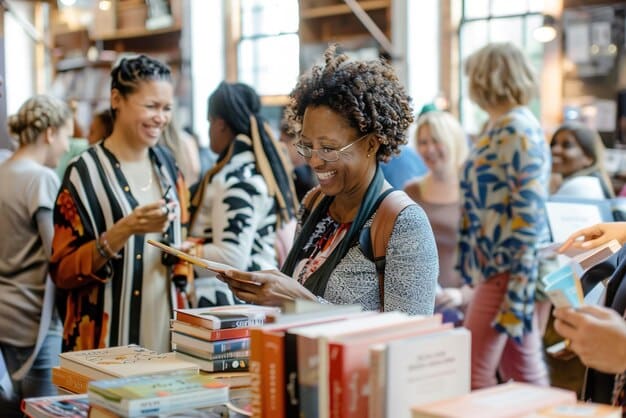Author Event Collaboration: Partner for Double Reach

Author event collaboration involves partnering with other authors to expand your audience, share resources, and create more engaging and impactful events, ultimately doubling your reach and impact in the literary community.
Navigating the literary world can be challenging, especially for authors who are eager to connect with readers and expand their reach. **Author event collaboration** offers a powerful strategy to achieve these goals by partnering with other authors, sharing resources, and creating more engaging events.
Understanding the Power of Author Event Collaboration
Author event collaboration is more than just teaming up; it’s a strategic alliance that leverages the strengths and networks of multiple authors. This approach can lead to increased attendance, broader audience engagement, and a stronger presence within the literary community.
Why Collaborate? The Benefits Unveiled
Collaborating with other authors can significantly enhance your reach and impact. By sharing resources, cross-promoting events, and pooling your audiences, you can create events that are more successful and rewarding for everyone involved.
Expanding Your Reach Through Partnerships
The key to successful author event collaboration is finding partners who complement your work and share your goals. This can lead to more diverse and engaging events that attract a wider audience.
- Shared marketing efforts: Jointly promote events to each author’s followers.
- Wider audience reach: Access to each other’s reader base.
- Enhanced event appeal: More varied content and perspectives draw larger crowds.
Collaborating on author events can create synergistic relationships that boost visibility and attract new readers. The combined effort often yields better results than solo endeavors.
Finding the Right Author Partners
Identifying compatible authors is crucial for a successful collaboration. Look for authors whose work complements yours, who share a similar audience, and who are enthusiastic about working together.

Assessing Compatibility and Shared Goals
Before partnering with another author, take the time to assess their work, audience, and goals. Ensure that your collaborative efforts are aligned and that you both stand to benefit from the partnership.
Networking and Building Relationships
Building relationships with other authors is essential for finding potential collaborators. Attend literary events, join writing groups, and engage with authors online to expand your network and identify potential partners.
- Attend local literary events and book fairs.
- Join writing groups and online forums.
- Engage with authors on social media.
Finding the right author partners requires careful consideration and relationship-building. The more aligned your goals and values, the more successful your collaboration will be.
Planning Collaborative Author Events
Once you’ve identified potential partners, the next step is to plan your collaborative event. This involves setting clear goals, dividing responsibilities, and creating a marketing plan that leverages each author’s strengths.
Setting Goals and Defining Roles
Clearly define the goals of your collaborative event and assign specific roles and responsibilities to each author. This ensures that everyone is on the same page and that tasks are completed efficiently.
Creating a Marketing Plan
A comprehensive marketing plan is essential for promoting your collaborative event and attracting a large audience. Leverage social media, email marketing, and local media to spread the word and generate excitement.
- Develop a social media strategy to promote the event.
- Create engaging content that highlights the benefits of attending.
- Utilize email marketing to reach potential attendees.
Effective planning and marketing are critical for the success of your collaborative author event. The more organized and strategic you are, the more likely you are to achieve your goals.
Maximizing Your Event’s Impact
To ensure that your collaborative author event leaves a lasting impression, focus on creating an engaging and memorable experience for attendees. This involves crafting a compelling program, providing opportunities for interaction, and following up after the event.

Crafting an Engaging Program
Design a program that is both informative and entertaining, incorporating elements such as readings, Q&A sessions, and interactive activities. This keeps attendees engaged and ensures that they leave with a positive impression.
Providing Opportunities for Interaction
Encourage interaction between authors and attendees by creating opportunities for conversation and networking. This can be achieved through book signings, meet-and-greet sessions, and informal discussions.
Maximizing your event’s impact involves creating an experience that is both engaging and memorable. The more positive the impression you make on attendees, the more likely they are to become loyal readers. Author-led panels can be excellent for this kind of engagement.
Leveraging Social Media for Promotion
Social media platforms are powerful tools for promoting author events and reaching a wider audience. Use these platforms to share information about your event, engage with potential attendees, and build excitement.
Creating Engaging Content
Develop content that is both informative and attention-grabbing, including event details, author bios, and behind-the-scenes glimpses. Use visuals such as photos and videos to enhance your posts and attract more viewers.
Using Hashtags and Keywords
Incorporate relevant hashtags and keywords in your social media posts to increase their visibility and reach. Research popular hashtags in your genre and use them strategically to connect with potential attendees.
- Use relevant hashtags to increase visibility.
- Share engaging visuals, such as photos and videos.
- Run contests and giveaways to generate excitement.
Leveraging social media effectively can significantly boost your event’s visibility and attract a larger audience. The more engaging and strategic your social media efforts, the more successful you will be.
Measuring Success and Building on Your Efforts
After your collaborative author event, take the time to evaluate its success and identify areas for improvement. This involves analyzing attendance numbers, gathering feedback, and assessing the impact on your audience reach.
Analyzing Attendance Numbers and Feedback
Track attendance numbers to gauge the popularity of your event and gather feedback from attendees to understand what they enjoyed and what could be improved. Use this information to refine your future events.
Building on Your Success
Use the insights gained from your collaborative event to build on your success and plan future partnerships. Identify what worked well and replicate those strategies in your next event.
- Track attendance and gather feedback.
- Identify areas for improvement.
- Plan future partnerships based on your findings.
Measuring success and building on your efforts is essential for continuous improvement and long-term growth. The more you learn from your experiences, the more successful your future collaborative author events will be.
| Key Aspect | Brief Description |
|---|---|
| 🤝 Partner Selection | Choose authors with complementary works and audiences. |
| 📅 Event Planning | Define goals, assign roles, and create a marketing plan. |
| 📣 Social Media | Use content and hashtags to promote the event. |
| 📊 Success Metrics | Track attendance and feedback for future improvements. |
Frequently Asked Questions
Author event collaboration involves partnering with other authors to co-host events. This approach can broaden your audience, share resources, and enhance the overall event experience for attendees.
Look for authors whose work complements yours and who share a similar target audience. Attend literary events, join writing groups, and engage on social media to network and find potential collaborators.
Key elements include clear goals, well-defined roles, a comprehensive marketing plan, and an engaging program that encourages interaction between authors and attendees. Effective social media promotion is also crucial.
Utilize social media platforms, email marketing, and local media to promote your event. Create engaging content, use relevant hashtags, and run contests to generate excitement and reach a wider audience.
Track attendance numbers, gather feedback from attendees, and assess the impact on your audience reach. Analyze this data to refine future events and build on your success. Learning from experiences ensures continuous improvement.
Conclusion
Author event collaboration is a powerful strategy for authors looking to expand their reach, share resources, and create more engaging events. By carefully selecting partners, planning effectively, and leveraging social media, you can double your impact and connect with a wider audience.
![Author Spotlight: Unveiling [Author's Name]'s Writing-Life Balance Author Spotlight: Unveiling [Author's Name]'s Writing-Life Balance - Cover Image](https://noveltiesnew.com/wp-content/uploads/2025/06/noveltiesnew.com_3_1750100051_30a4b85f_cover-360x180.jpg)




